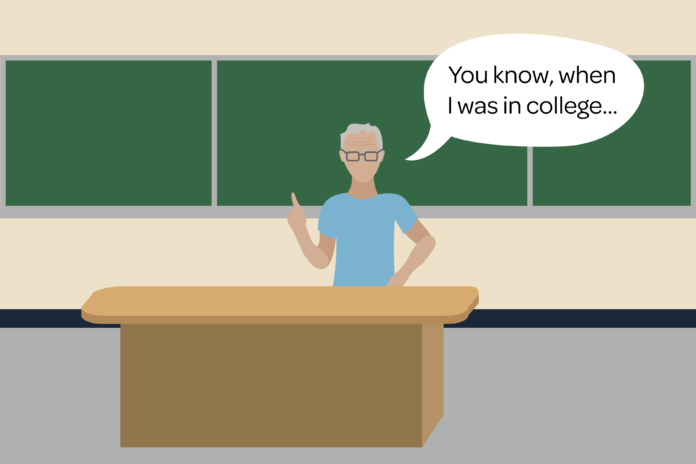Enderle, Dorsey reveal that they too had indirect paths
Whether they’re lecturing to a hall of 300 students or patiently explaining a difficult concept from class during office hours, it’s easy to forget that professors were once in the same shoes as struggling undergraduate students, unsure of their career path and trying to somehow find a healthy balance between academics and a social life.
Before becoming a beloved chemistry professor at UC Davis, Bryan Enderle was an undergraduate student at UC Berkeley, double majoring in chemical and petroleum engineering. Though he’s now known for his “Enderle Readers” for the general chemistry series and his engaging lectures sprinkled with his light-hearted humor, Enderle did not initially intend on pursuing academia.
“Even after grad school, [I had] no idea,” Enderle said. “Going into industry or going into research — that’s what I was expecting to do. I didn’t have much teaching experience before coming to Davis or the chemistry department here, so I didn’t know if I would enjoy it or not. It wasn’t until I got a position teaching that I realized ‘Oh, this is enjoyable.’”
Because he was pursuing an intense course load with his double major in engineering, Enderle said he formed close bonds with his classmates through their collaborative effort to do well. But as the years progressed, he found it more difficult to find a healthy balance between studying and focusing on his own well-being.
“I think I was so focused on school and studying at one point that it became all-consuming, and that wasn’t good for me personally and even for my studies,” Enderle said. “I had a conversation with one of my friends, and it helped realign me because I think when I was overfocusing on school, the anxiousness about school increased and I just didn’t realize it. And when I refocused myself, the weight of academics was lessened.”
Yet, he said that compared to students nowadays, he had much fewer extracurricular activities to balance. He recalls that he only held an undergraduate research position for one summer and noted that students today are often pursuing years of research experience, clinics and other outside experience. For him, though, his undergrad experience was more about learning how to study and achieve his goals in a healthy and effective way, which helped shape the path to his social growth and academic success in graduate school.
Most cognitive science majors have taken a course with Philosophy Professor Jonathan Dorsey, whose research focuses on philosophy of the mind and metaphysics. Though he eventually earned his bachelor’s degree in philosophy at Ohio State University, Dorsey navigated his way through his undergraduate years as a first-generation college student and switched his major from physics to philosophy at the end of his sophomore year.
As a first-generation college student, Dorsey said he often worked to support himself as much as he could, leaving little time for extracurriculars. In addition, coming from a rural high school in Ohio, Dorsey recalls the transition from high school to college being difficult.
“I had a bit of a wakeup call, because I thought high school was very easy, so I took advantage of it,” Dorsey said. “When I got to college, I realized it was much harder, and the expectations were a lot higher. I was a good student, but with effort, so I had to work very hard in a way that I wasn’t used to before.”
With his avid interest in astrophysics and intention of becoming a medical doctor, Dorsey began his undergraduate education as a physics major. But after the Winter Quarter of his second year, he realized that his reason for becoming a doctor was motivated by money and prestige and that he was not particularly interested in career opportunities in astrophysics either. Losing his motivation for a physics major, he experienced a moment of uncertainty about his future — a feeling undergraduate students may relate to.
His solution was to take three general education courses the following quarter: introductory level courses in psychology, philosophy and drawing. Though the latter didn’t pan out — according to him, his students can attest to his lack of drawing skills — he found his true love for philosophy and, in particular, philosophy of the mind.
“After that first philosophy course, I just wanted more, I just didn’t want to stop, and I remember looking through the course offerings and thinking, ‘I want to take all of these,’” Dorsey said. “I was thinking, ‘I don’t want to stop doing philosophy, so if I can make a career in it, then that’s what I’m going to do.’ And I was warned about how difficult it is to get into academia and I didn’t care. I just loved doing philosophy so much that if there [was] a way I [was] going to find it, and I just kept following my interest.”
While students may be in awe by the amount of knowledge professors possess or intimidated by the power they have over their grades, it’s reassuring to know that they, too, were once undergraduates with the same crises, conflicts and fluctuating aspirations.
Written by: Lei Otsuka — features@theaggie.org





